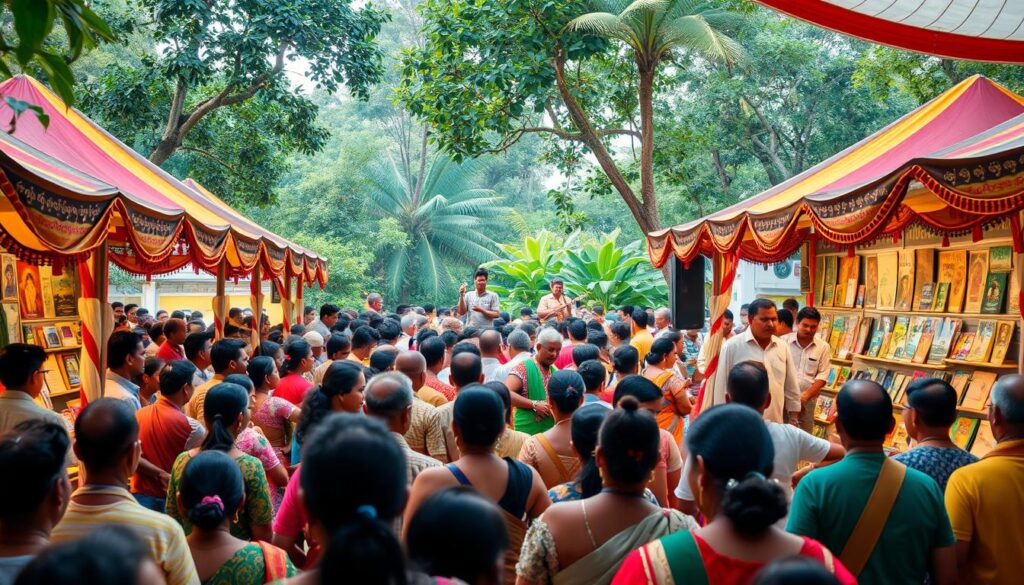Sri Lanka Closes Schools as Floods and Death Toll Hits 16
Sri Lanka has shut down schools due to a major natural disaster. Heavy monsoon rains have caused flash floods and mudslides, killing at least 17 people. This emergency has impacted over 80,000 people, mainly around areas like Colombo.
The Department of Meteorology in Sri Lanka warns of more rain in certain provinces. Rivers like Kalu, Nilwala, and Attanagalu Oya are at major flood levels. While the Gin and Kelani rivers are not as high, they still present risks.
Natural Disaster Updates show that flooding has affected 84,749 people from 21,353 families. Schools in Sri Lanka are closed to keep kids and teachers safe. Classes will resume when it’s safer.
Recent economic troubles make the flood crisis worse. According to OMP Sri Lanka, the country is facing bankruptcy. This makes rescue operations and helping those in need even more urgent.
Natural Disaster Strikes: Overview of the Crisis in Sri Lanka
Sri Lanka, an island in South Asia, is going through tough times. The country is hit by floods and mudslides. This is because of heavy monsoon rains. It’s a big issue that’s causing harm to people and places.
Impact of Heavy Rains and Resulting Mudslides
Heavy rains have filled up rivers, leading to floods and mudslides. Many areas are affected. About 240 homes got damaged. This shows how big the problem is. It tells us we need better plans to handle such disasters.
Emergency Measures and School Closures
The government is taking action to fight this disaster. They have closed schools for safety. It’s to protect everyone from harm. This move is to stop the disaster from getting worse.
Death Toll and Casualties Amidst Catastrophic Floods
So far, 16 people have lost their lives due to these disasters. Some were swept away by floods or buried in mudslides. Navy and army units are helping out. They’re part of the rescue and support efforts. As we help those in need now, we also worry about fixing everything after.
This situation in Sri Lanka is a clear warning. It shows how climate change is making disasters worse around the world. We need to talk globally about how to deal with this. Keeping updated on Sri Lanka news is crucial. We all must work together to help those affected and to prevent this in the future.
Sri Lanka Closes Schools as Floods and Mudslides Death Toll Rises to 16
The government of Sri Lanka has closed schools nationwide due to the natural disaster. This action was taken as the death toll from floods and mudslides reached 16. These events have affected over 80,000 people, showing the big challenges in disaster management.
The Disaster Management Center of Sri Lanka has been very active. They’ve issued warnings and carried out evacuations. With schools closed, it shows the government’s focus on emergency response and keeping people safe. This is crucial as the news about Sri Lanka stresses the need for more resources to face such disasters.
The closure of schools in crises affects education for a long time. So, there are plans to update the school curriculum. The Education Ministry wants to improve students’ critical thinking and digital skills. For details, check this curricular guideline.
In Sri Lanka, rivers like Kalu, Nilwala, and Attanagalu Oya are flooding. Gin and Kelani rivers have minor floods. The ongoing rain makes managing the natural disaster harder.
The crisis in Sri Lanka reminds us of how destructive natural disasters can be. It highlights the need for well-prepared strategies and strong infrastructure. Closing schools is a step to protect kids. It’s part of careful efforts to help the nation recover and rebuild.
National Response and International Support
After Sri Lanka faced devastating floods, the national Emergency Response was quick and strong. The military and disaster teams jumped into action, helping those in need. OMP Sri Lanka kept everyone informed about the disaster response, playing a key role during the crisis. They made sure affected people got food, shelter, and medical care to lessen the flood’s impact.
The world came together to help Sri Lanka recover. Many countries sent aid, including supplies and medical help, boosting Sri Lanka’s ability to bounce back. Specifically, 16 countries provided essential aid and funds. This global support showed how countries unite to help others in trouble.
Sri Lanka is also working on improving education and crisis management. The government is investing in modern technology and sustainability. For more information on these educational changes, check out the initiatives announced by the government. These steps aim to prepare the country for a better, more resilient future.


 showcase local talent in Sinhala, Tamil, and English literature. The festivals provide a platform for established and emerging writers to share their works.
showcase local talent in Sinhala, Tamil, and English literature. The festivals provide a platform for established and emerging writers to share their works.